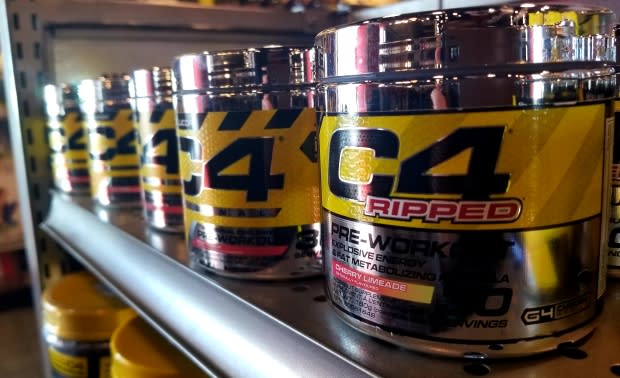Athletes playing 'Russian roulette' when taking workout supplements, says doping expert
The recent suspension of a University of Regina athlete has sparked warnings from experts about over-the-counter workout supplements.
Kyle Borsa received a 16-month ban from university athletics due to a banned — but legal — substance that was in a pre-workout supplement.
Paul Melia, president and CEO of the Canadian Centre for Ethics in Sport (CCES), said the workout supplement industry is "virtually unregulated."
"A little Russian roulette going on there," he said.
Dan Farthing, the director of sport performance training services at Level 10 fitness, said that while many supplements are inspected and regulated, athletes need to be diligent with what they consume.
"An athlete is 100 per cent responsible for what he or she puts in his or their body," Fathing said.
Anti-doping rule violation
Borsa is one of just 13 players in U of R football history to compile at least 2,000 all-purpose yards. He led the Canada West conference last season with six rushing touchdowns, placed second in the conference in all-purpose yards and rushing yards and had the third most rushing yards per game.
Borsa failed a doping test administered on Oct. 16, 2018, according to a report by CCES. His urine tested positive for a banned substance called higenamine.
Higenamine is listed as a "specified substance" on the CCES' prohibited list and was banned by the World Anti-Doping Agency in 2017.
According to the CCES report, Borsa tested positive for higenamine because of Allmax Impact, an over-the-counter supplement he bought from Supplement King in Regina.
"He said he was very busy with classes, film study (for football), practices and games and workouts," the report says.
"He felt tired all the time and found he was losing his desire to work out. He felt he needed more energy and suggested it was popular among football players to take pre-workout supplements for this additional energy."
Supplements in high demand
Farthing, a former Saskatchewan Roughrider who also consults for the Canadian Sport Center of Saskatchewan, said it's common for athletes to use supplements.
"There's always, I guess, a need or want for athletes to maximize their performance and to kind of get the most they can out of themselves," he said.
He said that while there are some concerns about over-the-counter-supplements, many are regulated by the World Anti-Doping Association (WADA) and inspected by secondary organizations NSF and Informed-Choice, which put labels on products that meet WADA requirements.

"If they don't have those two logos an athlete should not be taking them," said Farthing.
"There's always a situation or a circumstance where a certain substance claims a performance benefit, and it might very well provide that, but if it contains a substance that is banned it will definitely not have those stickers on it."
'It's just very risky'
Borsa had passed four previous doping tests before taking Allmax Impact Igniter, according to the CCES report. In this instance, he did not compare ingredients on supplements with CCES' list of banned substances, the report says.
Borsa declined an interview, but the report says he has taken responsibility and admitted he could have done more to check for banned substances.
Higenamine is not illegal, but it is banned under CCES rules.
"That happens more and more," said Melia.
It's not always as simple as just checking the label or consulting with coaches and trainers, he said.
Higenamine is listed as an ingredient on Allmax Impact Igniter's website, but Melia said other supplements may contain banned substances without the manufacturer, or consumer, knowing it.
In some cases, different products are prepared with the same machinery. In others, leftovers from one product might be mixed in with a batch of another.
In some extreme cases, the manufacturer might intentionally not include an effective but banned ingredient on a label, Melia said.
"It's just very risky because you cannot be sure what is on the label is in the product," he said.
Store accountability
The CCES report says Borsa got the supplement from Supplement King in Regina.
Borsa told CCES the salesperson at the supplement store "gave a 'bit of a sales pitch', describing Allmax Impact Igniter as a good supplement for him," the report says.
He did not ask the salesperson if it contained any banned substances, according to the report, but the salesperson said the store does not sell anything that's banned.
We live in an age of information, so access to that information is readily available. - Dan Farthing
Farthing said that while athletes are responsible for what they consume, there also needs to be accountability from businesses selling supplements.
"If they're relaying inaccurate, or completely false, or are wrong information and it costs an athlete who is who is headed toward a career, perhaps a professional career, then for sure there's liability," he said.
CBC News requested an interview from Supplement King but did not receive a response.
Minimizing risks
Melia recommended athletes avoid consuming workout supplements, or at least only take supplements from reputable companies that have undergone regulatory inspections and include a drug and predation number on the label.
Farthing recommends athletes always double-check what they can and can't have in their systems.
"We live in an age of information, so access to that information is readily available," said Farthing.
He also recommended consulting with a sports nutritionist or registered dietitian.
Melia said athletes can contact the manufacturer of a supplement and ask for a written list of the ingredients and confirmation there hasn't been any cross contamination if they are unsure about a product. He said athletes can also contact CCES.
Lists of banned substances can also be found on CCES' and WADA's website.

